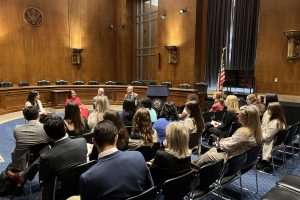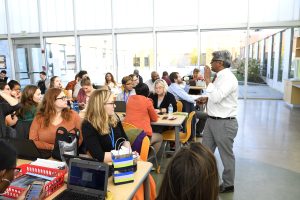The schools, organizations, and communities we serve are confronting complex, far-reaching problems. Some are long-standing; others have exploded only recently into our collective consciousness. More than ever, it is clear that these challenges will require deep, empirically informed change.
Today’s Education Challenges Call for Change
-
Health and Well-being
Students increasingly are being diagnosed with mental health disorders, challenging educators to move beyond an emphasis on academic achievement to one addressing mental health and social-emotional well-being.

-
Entrepreneurial Solutions
States and districts are experimenting with policy approaches that emphasize entrepreneurial solutions to school safety and early childhood education, and for-profit startups are competing with nonprofit, traditional providers

-
Addressing Inequity
Education occurs in a context of growing societal and racial inequity—particularly in cities like Baltimore. Through our operation of the Henderson-Hopkins School, we have seen how local challenges reflect global ones.

-
Changing Practice at Scale
Research funders and consumers of research are requiring more rigorous studies that demonstrate the capacity to change practice at scale and make a lasting, positive impact.

Health and Well-being
Students increasingly are being diagnosed with mental health disorders, challenging educators to move beyond an emphasis on academic achievement to one addressing mental health and social-emotional well-being.

Entrepreneurial Solutions
States and districts are experimenting with policy approaches that emphasize entrepreneurial solutions to school safety and early childhood education, and for-profit startups are competing with nonprofit, traditional providers

Addressing Inequity
Education occurs in a context of growing societal and racial inequity—particularly in cities like Baltimore. Through our operation of the Henderson-Hopkins School, we have seen how local challenges reflect global ones.

Changing Practice at Scale
Research funders and consumers of research are requiring more rigorous studies that demonstrate the capacity to change practice at scale and make a lasting, positive impact.

Creating and Translating Knowledge for Impact
-
Addressing the Social Determinants of Education
Since much of what influences student learning happens in homes and communities, we focus on school climate, social-emotional learning, family engagement, career readiness, mental health and trauma, and other work to address the broadest needs of students and give schools the approaches, methods, and tools to help them thrive.

-
Advancing Equity and Social Justice
Recognizing that our society cannot afford to fail to develop the potential of individuals who are at risk of being left behind, the School of Education will act to advance equity and social justice through its training of leaders for diverse contexts and to apply knowledge toward improving outcomes for underserved students and organizations.

-
Supporting Diverse Learners—and Educators
As learners have unique and diverse educational and mental health needs that must be understood to teach them effectively, we prioritize work in learning differences, neurodiversity, tutoring, data analysis, and other areas across the spectrum of academic ability—as well as the needs of those who teach, counsel, and advocate on students’ behalf.

Addressing the Social Determinants of Education
Since much of what influences student learning happens in homes and communities, we focus on school climate, social-emotional learning, family engagement, career readiness, mental health and trauma, and other work to address the broadest needs of students and give schools the approaches, methods, and tools to help them thrive.

Advancing Equity and Social Justice
Recognizing that our society cannot afford to fail to develop the potential of individuals who are at risk of being left behind, the School of Education will act to advance equity and social justice through its training of leaders for diverse contexts and to apply knowledge toward improving outcomes for underserved students and organizations.

Supporting Diverse Learners—and Educators
As learners have unique and diverse educational and mental health needs that must be understood to teach them effectively, we prioritize work in learning differences, neurodiversity, tutoring, data analysis, and other areas across the spectrum of academic ability—as well as the needs of those who teach, counsel, and advocate on students’ behalf.

Actions
Given the deep and sweeping changes confronting schools and human services organizations, the Johns Hopkins School of Education leverages its considerable talents and resources to become a national leader in creating knowledge and translating it into means for impact. Guided by our vision, we engage in two defining actions.
Developing Leaders for Diverse Educational Contexts
Today’s diverse learners and learning environments demand flexible, resourceful educators who can spot problems and opportunities across a range of contexts. The School of Education leverages its expertise across all academic programs to develop the world’s most innovative 21st-century education leaders. We facilitate learning experiences that foster the skills, insights, and knowledge for critically examining factors within systems in education contexts; by evaluating unique and diverse needs of individuals situated in their contexts; by collaborating with stakeholders and research-practice partners; and by utilizing creative and rigorous methods to develop appropriate solutions and interventions.
Academic Programs
Our graduates—and the faculty they learn from—are leaders in the classroom, in the communities they serve, and in the field of education.

919 degrees awarded awarded annually (2021-22)
Academic Programs
Our graduates—and the faculty they learn from—are leaders in the classroom, in the communities they serve, and in the field of education.

919 degrees awarded awarded annually (2021-22)
Making Knowledge Relevant and Actionable
The schools, organizations, and communities we serve are confronting complex, far-reaching problems, from meeting the social, developmental, and educational needs of students to distributing resources in efficacious ways. The School of Education creates innovative, evidence-based policies, methods, and tools to address these challenges. We are a world leader in producing and translating cutting-edge knowledge, as well as in developing high-impact policies, methods, analytical tools, and applications, that advance education and serve our communities. To that end, we work to make research more rigorous, actionable, and scalable; to leverage technology; and to develop accessible data systems for research, implementation, and evaluation.
Solutions
We’re passionate about providing our partners with the tools and knowledge they need to create a better future for all students.

Solutions
We’re passionate about providing our partners with the tools and knowledge they need to create a better future for all students.

Our Community
During this dynamic and challenging time for education, we reaffirm the pivotal importance of our students, staff, faculty, and leadership—the people who work to realize our strategic vision. We remain committed to working collaboratively; building a productive, supportive culture; promoting and recruiting candidates from diverse backgrounds; and inspiring our community to foster positive teaching and learning environments.